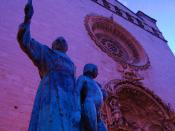Miquel Joseph Serra was born and baptized on November 24, 1713 in Petra, a farming village on the island of Mallorca, Spain. As a child he attended a Franciscan elementary school. At the age of fifteen, Serra left home to enter the Franciscan University in Palma to study philosophy. When Serra was sixteen, he decided to join the Franciscan Order.
After years of preparation and careful consideration of his vocation, Serra received his Franciscan habit in 1730 and took the name Junipero which meant Jester of God. He chose the religious name Junipero, after a companion of Saint Francis of Assisi who was simple, sincere, and good-natured man. When the original Junipero was condemned by others Saint Francis was to have remarked: "My brothers, my brothers, I wish I had a forest of such junipers." Serra was ordained in 1737. He taught for seven years at Lullian University of Mallorca.
In 1744 he was named Professor of Philosophy at the monastery of San Francisco and at Lullian University. Serra was known as bright, articulate, scholar, a moving speaker, and a clear precise writer. He did not remain long in the academic venue. His dream was to become as missionary and in 1749 he responded to the call for Franciscan missionaries to the New World. His dream became a reality. He left his family and friends and sailed off to a "New World." Nearly 200 years earlier, Spain had established a colony called New Spain, the region known today as Mexico. Successful colonization was the result of collaboration by Spanish imperial staff and the Catholic Church. Acting as partners in efforts of exploration and settlement, both their purposes were achieved: Spain claimed a new territory and the Catholic Church claimed new members.
By the middle of the 18th century, Spanish cultural...


